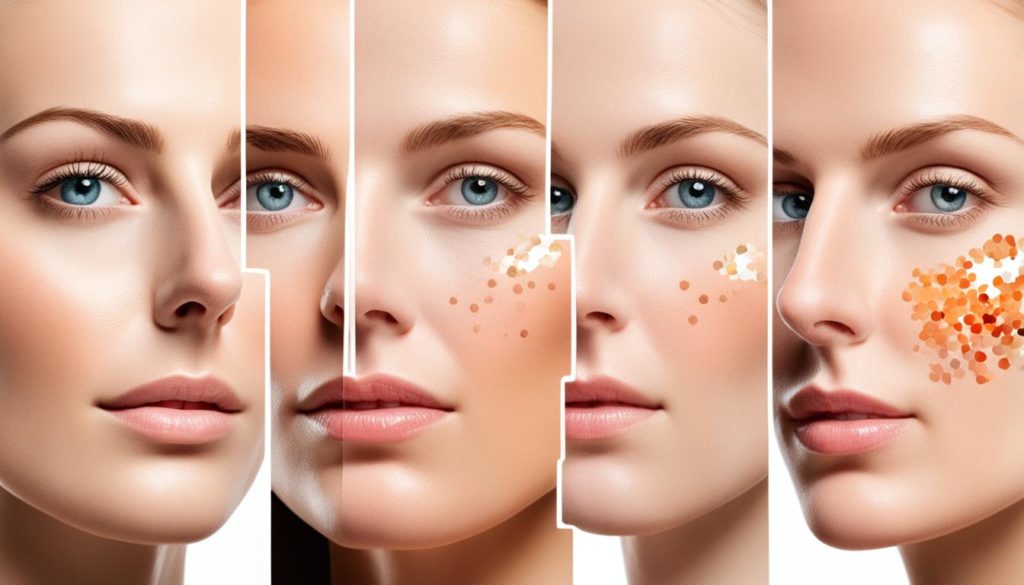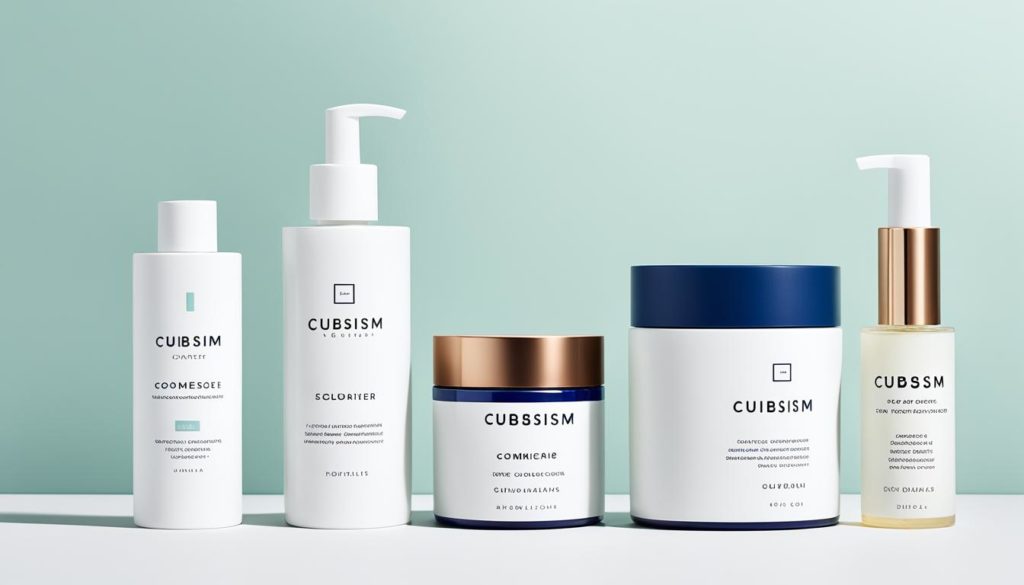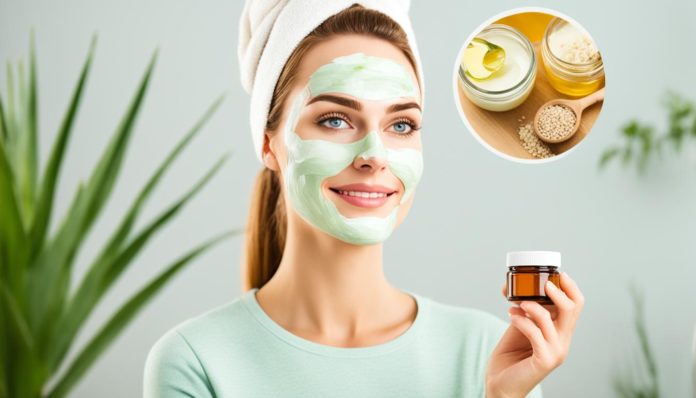Did you know about 85% of young people, from 12 to 24, face some acne? This shows that mild acne is really common. It affects millions who want clear skin. To win against acne, you must find strategies that match your life. This means setting up a good skincare routine, making some changes in your life, and using products you can buy without a prescription. Doing these can help you manage and treat mild acne well.
Key Takeaways:
- Understanding and identifying mild acne is the first step toward effective treatment.
- A daily skincare routine is essential for managing and preventing acne.
- Over-the-counter products like benzoyl peroxide and salicylic acid are effective mild acne solutions.
- Home remedies and lifestyle changes can complement professional acne treatment strategies.
- Consultation with a dermatologist may be necessary for persistent acne issues.
Understanding Mild Acne
Mild acne is less severe acne. It includes occasional breakouts, whiteheads, blackheads, and mild pimples. It’s vital to know how mild acne looks and what causes it. This knowledge helps people care for their skin better.

What is Mild Acne?
Mild acne has minor pimples, blackheads, and whiteheads. It doesn’t have severe cysts or nodules. This makes it easier to treat. You can use over-the-counter products and proper skincare. Knowing the signs of mild acne aids in choosing the right treatments for clear skin.
Common Causes of Mild Acne
It’s important to know what leads to mild acne. Several factors play a part, such as:
- Hormonal Fluctuations: Changes in hormones during puberty, menstruation, and pregnancy can cause mild acne.
- Stress: Stress can increase cortisol. This hormone boosts oil production in the skin, leading to acne.
- Improper Skincare Routines: The wrong skincare products can make acne worse. Use gentle cleansers and non-clogging products.
- Genetics: If your family has acne, you might get it too. This shows acne can be inherited.
Knowing these causes helps in preventing and managing mild acne. By using the right skincare, people can lessen breakouts and have healthier skin.
Daily Skincare Routine for Acne-Prone Skin
Making a daily skincare plan is key to handle acne-prone skin well. Using the right products regularly makes the skin healthier and lowers acne problems. Let’s look at the main steps for a good skincare routine.
Importance of Cleansing
Cleansing gently is the starting point of any good skincare routine to prevent acne. It’s important to clear away dirt, extra oil, and dead skin that can block pores and cause breakouts. Use a cleanser made for acne-prone skin to keep your skin’s natural balance and avoid irritation.
Choosing the Right Moisturizer
Even oily and acne-prone skin needs moisture. Using non-comedogenic moisturizers means your skin stays moist without blocked pores. Find products that moisturize without being oily and skip any with oil or thick ingredients.

Sun Protection
Adding sunscreen to your daily routine is vital to shield your skin from UV harm, which can make acne worse and lead to other skin problems. Pick a broad-spectrum sunscreen that’s light and won’t clog your pores or make your skin oily. This often-forgotten step is crucial for full acne care.
Over-the-Counter Treatments for Mild Acne
Seeking immediate acne treatment success? Over-the-counter options can really help with mild acne. Products like benzoyl peroxide, salicylic acid, and adapalene are great. They fight acne-causing bacteria, boost skin renewal, and keep pores clear. This makes them key in effective acne care for different skin types.
Benzoyl Peroxide Products
Benzoyl peroxide is a star in the acne-fighting scene. It kills bacteria under the skin and helps reduce swelling. Plus, it clears pores. With regular use, it makes a big difference. Brands like Neutrogena and Clean & Clear have affordable options that really work.
Salicylic Acid Applications
Salicylic acid is crucial for clear skin. It sloughs off dead skin and speeds up cell renewal to avoid pore blockages. Products with salicylic acid from brands like Murad and Paula’s Choice are great for handling mild acne.
Adapalene for Acne Treatment
Adapalene, once prescription-only, is now available over-the-counter in products like Differin Gel. As a retinoid, it promotes skin renewal and unclogs pores while reducing swelling. It’s now a top pick in acne care for those looking for real results.
Home Remedies for Treating Mild Acne
For those preferring natural acne solutions, many DIY methods offer a good alternative to commercial products. Essential oils, like tea tree oil, are great because they fight bacteria. Honey is also praised for making skin clearer with its antibacterial and moisturizing properties.
Drinking green tea or applying it to your skin can lessen inflammation and help acne-prone skin. These home acne treatments are not just easy to find. They also promote taking care of your skin in a natural way.
Before trying these natural remedies, it’s important to know how your skin will react. Since everyone’s skin is different, doing a patch test first is a good idea.
| Natural Ingredient | Benefits | Application |
|---|---|---|
| Tea Tree Oil | Antibacterial, reduces inflammation | Spot treatment |
| Honey | Moisturizing, antibacterial | Face mask |
| Green Tea | Reduces inflammation, antioxidant-rich | Drink and apply topically |
These DIY acne solutions can be helpful, but they might not always work as well as store-bought treatments. This is because natural products aren’t regulated the same way.
Diet and Lifestyle Changes to Prevent Acne
Getting to know the diet for clear skin and how lifestyle affects acne is key. This helps avoid breakouts and keeps your skin healthy. We’ll look at what to eat and habits that lower acne chances.
Anti-Acne Diet Tips
Eating well is essential for acne-free skin. Try these food tips:
- Incorporate Omega-3 fatty acids: You can find these in fish, flaxseeds, and walnuts. They fight inflammation.
- Eat antioxidant-rich foods: Berries, dark chocolate, and green veggies protect your skin from damage.
- Reduce high-glycemic foods: Foods like white bread and sweets can cause insulin spikes and acne.
- Limit dairy intake: Studies show dairy might increase pimples and breakouts.
Stress Management Techniques
Stress can make acne worse. Here’s how to handle stress:
- Practice mindfulness meditation: It promotes relaxation and can help with acne caused by stress.
- Engage in regular physical activity: Exercise lowers stress and boosts your health.
- Develop a consistent sleep schedule: Enough sleep keeps cortisol in check, which helps prevent acne from stress.
- Try deep-breathing exercises: Breathing right can calm you down and lower stress.
When to Consult a Dermatologist
Sometimes, you need to see a skin doctor if acne won’t go away with normal treatments. Getting help from a dermatologist early can stop scars and control breakouts better. It’s important to know when to get medical advice for acne for treatments that really work for you.
- Persistent Breakouts: If acne stays after using regular treatments for 2-3 months, seeing a skin doctor is a good idea.
- Severe Acne: Hard to treat acne like cystic or nodular types need stronger medicines from a dermatologist.
- Psychological Impact: If acne makes you feel bad about yourself or causes stress, it’s time to seek help.
Skin doctors create special treatment plans that might include creams or pills you can’t get without a prescription. These plans are made just for your skin type and acne causes.
Dermatologists also have access to treatments like lasers or chemical peels, which you can’t get on your own. Getting medical advice for acne from them means you’re getting the best care possible for your skin.
Myths and Misconceptions About Acne
Acne is very common in people of all ages. Yet, there are many wrong beliefs that can stop effective treatment and prevention. In this section, we will correct some myths and share true information for better skin health.
Common Acne Myths
A big myth is that eating chocolate causes acne. Diet does affect skin health, but no proof shows chocolate directly causes acne. Another myth is that greasy food causes acne. While bad fats in diet can impact health, they don’t directly cause acne. It’s also not true that only teenagers get acne; adults can have it too, due to hormones, stress, and other reasons.
Truths About Acne Prevention
To prevent acne, it’s important to know its real causes. Genes play a key role in acne risk. Hormone changes and skincare habits also affect acne. Keeping a good skincare routine is crucial.
Washing or scrubbing your face too much can make acne worse. It’s important to use products right for acne-prone skin and to get advice from experts when needed.
Choosing the Best Acne Products
Finding the right acne products can feel overwhelming. It’s key to look at ingredients and reviews to make a good choice. Focus on products with proven ingredients and lots of positive feedback to find what works best.
Evaluating Ingredients
Start by looking at what’s in acne products. Ingredients like benzoyl peroxide and salicylic acid are often in top treatments. Know what each does and their side effects. For reliable info, check sources like the Mayo Clinic.
Product Reviews and Recommendations
Reading reviews helps you decide on acne products. Real reviews can tell you more than what companies say. Look for products that get good marks consistently. Sites like Amazon and Sephora have lots of reviews to help.
To pick the best acne treatments, here are some tips:
| Product | Key Ingredients | User Rating |
|---|---|---|
| Proactiv Solution | Benzoyl Peroxide, Glycolic Acid | 4.5/5 |
| La Roche-Posay Effaclar | Salicylic Acid, LHA | 4.7/5 |
| Neutrogena Oil-Free Acne Wash | Salicylic Acid | 4.3/5 |
For more advice on acne products, look at dermatologists’ advice and reviews. This makes sure you’re making choices based on real facts and success stories. Visit trusted dermatological sources for help.
Building an Effective Acne Care Routine
Creating a personalized acne routine is pivotal for achieving clear skin. It all begins with knowing your skin type and what causes your breakouts. Start with selecting gentle cleansers. They shouldn’t strip the skin of natural oils. Cleansing twice daily helps remove dirt, oil, and impurities. This keeps pores clear and supports a healthy complexion.
Incorporate treatments like benzoyl peroxide or salicylic acid into your skincare. These ingredients are great for targeting bacteria and shedding dead skin cells. They help maintain clearer skin. It’s important to start using these treatments slowly to prevent irritation. Adding a moisturizer for your skin type keeps the skin hydrated without causing more breakouts.
Being consistent with skincare is crucial. Treatments work best when applied regularly, and a morning and night routine boosts their effect. Also, never forget the importance of sun protection. Sunscreen defends your skin from harmful UV rays that can worsen acne and damage the skin over time. Follow your acne care routine closely, and your skin will become healthier and clearer.
FAQ
What are the most effective strategies for treating mild acne?
To treat mild acne, start with a good skincare routine and some lifestyle changes. Gentle cleaning and using products that don’t block pores are key. You might also try treatments like benzoyl peroxide or salicylic acid.
Eating healthy and reducing stress also play a big part. If these steps don’t help, a dermatologist might suggest other treatments.
What is mild acne?
Mild acne may show up as occasional breakouts, whiteheads, blackheads, and small pimples. It’s less intense than severe forms of acne. Knowing your type of acne is important to find the right treatment plan.
What are common causes of mild acne?
Hormonal changes, stress, bad skincare habits, and genetics can cause mild acne. Changes during puberty, menstruation, and pregnancy often trigger it. Stress can make your skin oily, worsening acne. Some products might block your pores, and genes may affect your acne risk, too.
Why is cleansing important for acne-prone skin?
Cleansing helps remove dirt, oil, and dead skin that can block pores. Using a gentle cleanser twice a day keeps your skin clear and can prevent acne. Choose cleansers that don’t irritate your skin.
How do I choose the right moisturizer for acne-prone skin?
For acne-prone skin, use moisturizers labeled non-comedogenic. Look for ingredients like hyaluronic acid and glycerin that hydrate without causing breakouts. Avoid heavy creams and oils to keep acne at bay.
Is sun protection necessary for acne-prone skin?
Yes, protecting your skin from the sun is key. A good sunscreen prevents damage and reduces the risk of dark spots after pimples heal. Choose a broad-spectrum sunscreen that’s also non-comedogenic.
What over-the-counter treatments are effective for mild acne?
For mild acne, benzoyl peroxide, salicylic acid, and adapalene are great choices. Benzoyl peroxide kills acne-causing bacteria. Salicylic acid helps remove dead skin. Adapalene, a retinoid, prevents pore blockages. Together, they tackle mild to moderate acne.
Are there any home remedies for treating mild acne?
Yes, some home remedies can help. Tea tree oil, honey, and green tea have properties that fight acne. But, be careful and do a patch test first since everyone’s skin is different.
What diet and lifestyle changes can prevent acne?
Eating less sugar and dairy may help prevent acne. Foods high in omega-3s and antioxidants are good choices. Also, manage stress with techniques like meditation or exercise. And don’t forget about getting enough sleep. These changes can lead to clearer skin.
When should I consult a dermatologist for my acne?
If over-the-counter treatments don’t work or your acne gets worse, see a dermatologist. If acne affects how you feel about yourself, a professional can offer a custom treatment plan. This may include prescription medications.
What are some common myths about acne?
Many believe chocolate and greasy foods cause acne, and that it’s only a teen problem. However, diet’s role is complicated, and other factors like hormones are more important. Acne can hit at any age. Knowing facts helps in treating acne correctly.
How can I choose the best acne products?
Pick acne products with proven ingredients like benzoyl peroxide, salicylic acid, and retinoids. Look at reviews and recommendations too. Trustworthy brands often have the most effective products for dealing with acne.
How can I build an effective acne care routine?
Your acne routine should fit your skin’s needs. Start with gentle cleansing, then apply treatments known to work, like benzoyl peroxide. Moisturize with products that don’t clog pores and use sunscreen daily. Be consistent for best results.


